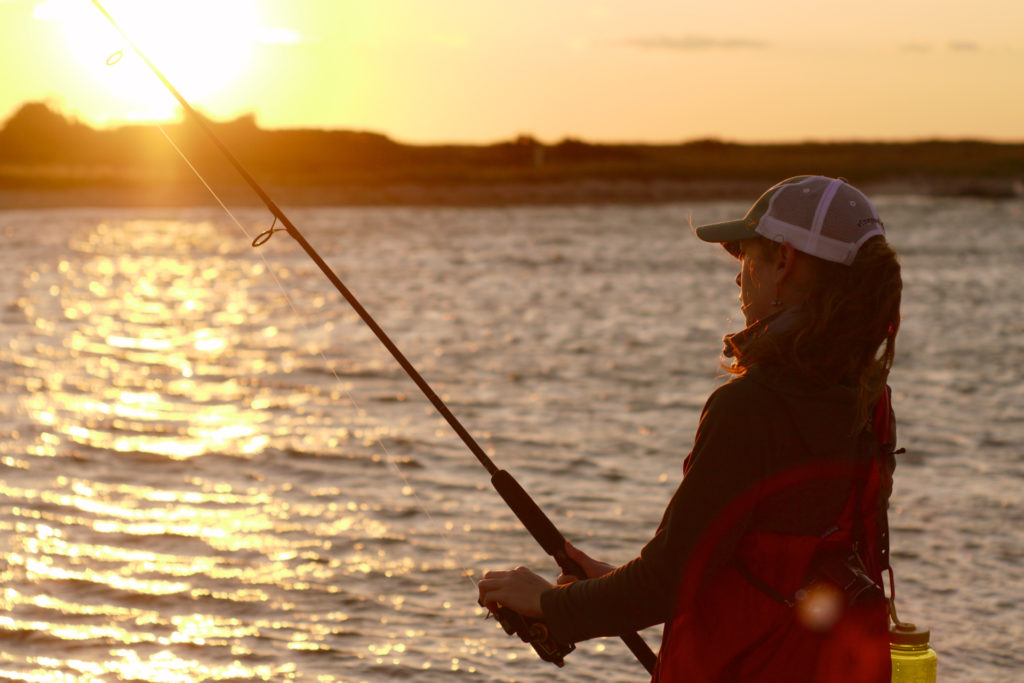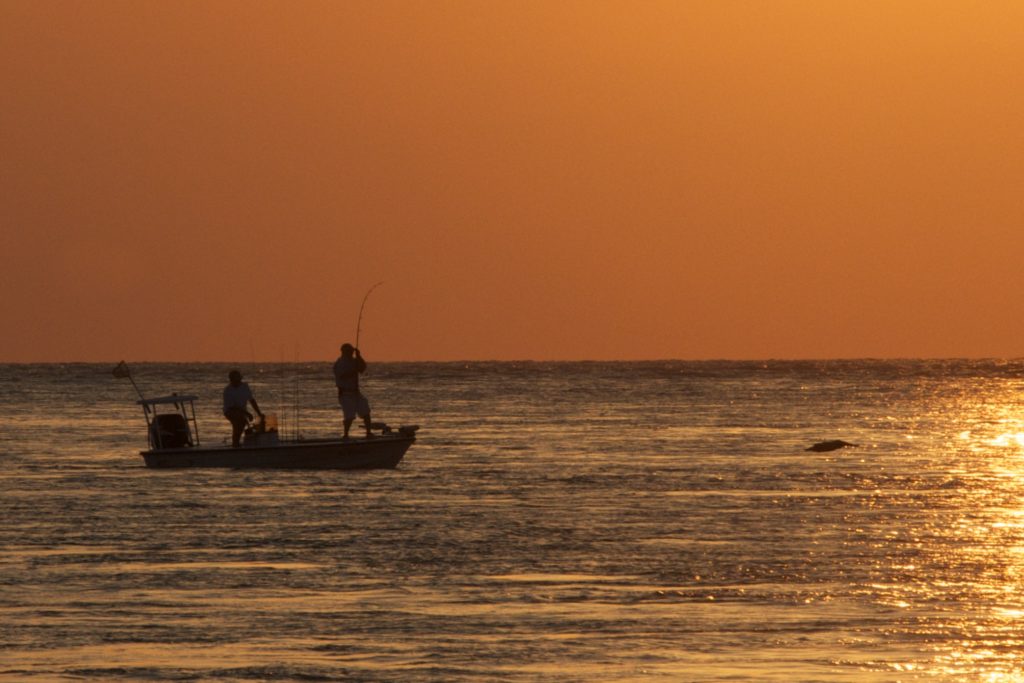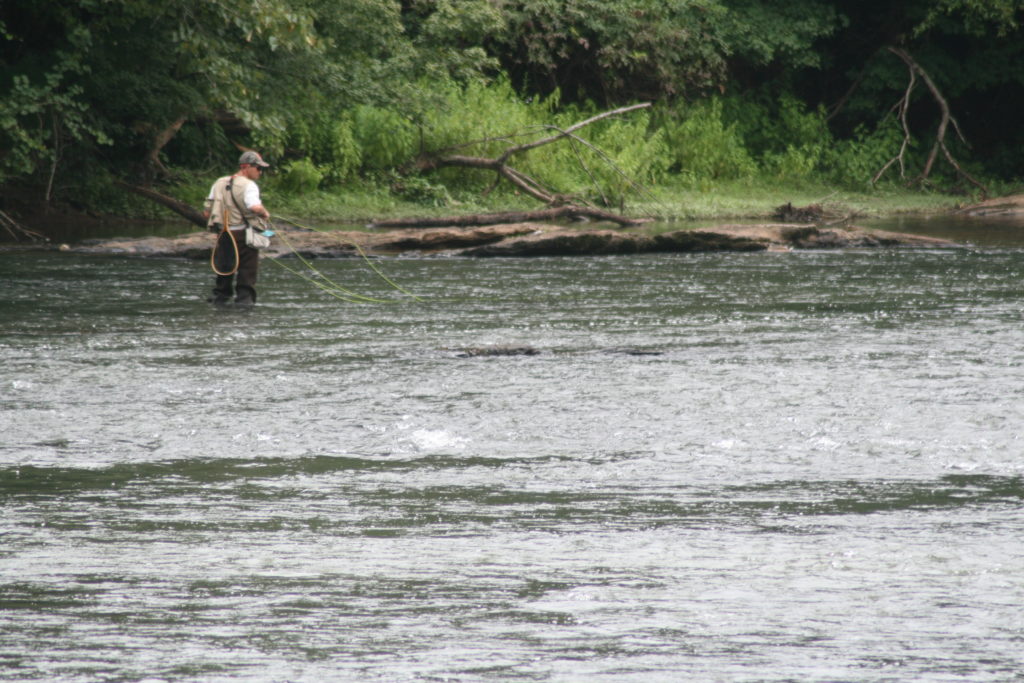Bristol Bay: Credit Jonny Armstrong
Do you have any thoughts on this post?
The Modern Fish Act would allow updated management approaches that acknowledge the difference between recreational and commercial fisheries, and it’s nearing the finish line
Saltwater anglers celebrate this time of year, knowing that the bulk of winter has passed and warmer temperatures, calmer seas, and lines stretched by sportfish of all sorts are likely just a few weeks away.
But the Senate Commerce, Science, and Transportation Committee recently gave anglers another reason to be optimistic about March’s arrival—last week, they approved the Modernizing Recreational Fisheries Management Act of 2017, also known as the Modern Fish Act, by a wide margin. A bipartisan contingent of 22 out of the 27 committee members voted to approve the bill and advance it to the Senate floor.
This is great news for America’s anglers, because the bill contains a host of provisions aimed at improving federal management of recreational fishing, specifically by acknowledging in federal law—finally—that recreational and commercial fishing have fundamentally different approaches and management should be “adapted to the characteristics of each sector.”
The Modern Fish Act allows regional fisheries management councils to maintain conservation measures and explore approaches that update management to better serve anglers. This includes strategies that have been very successfully used by state agencies to manage coastal and inland fish species.
The bill also calls for NOAA to work with the National Academies of Sciences to examine and improve data collection programs for recreational fisheries. More state-collected stock assessment and recreational harvest data could be used by federal managers under the Modern Fish Act, as well. More precise harvest data could result in longer, more stable recreational seasons.

Under the bill, NOAA will need to take a hard look at commercial and recreational fishing allocations in the Gulf of Mexico and South Atlantic to determine if current allocations are based in the best available data and meet the economic and cultural needs of the entire fishery—not simply the commercial side. This could mean more fish allocated to recreational or commercial harvest, depending on how conditions have changed, but the updates are critical. Many current allocations are based in information from three decades ago or more and have not been examined with an eye toward meeting both sectors’ needs.
Finally, the Modern Fish Act calls for a thorough examination of the social and economic impacts of implementing additional limited-access privilege programs, also known as individual fishing quota systems, in fisheries shared by commercial and recreational users. While individual fishing quotas have worked well in the Alaskan crab and Pollock fisheries, which are entirely commercial, they aren’t suited for recreational fisheries where the fish must continue to support every American’s opportunity to fish.
Sportsmen would never suggest that private companies and individuals own ducks, deer, or largemouth bass—and private ownership of saltwater sportfish should not be tolerated either.
It is important to note that this bill has garnered broad bipartisan support since being introduced by Mississippi Republican Roger Wicker and Florida Democrat Bill Nelson last July. Twelve co-sponsors have added their names to the bill over the last eight months, split almost evenly between Democrats and Republicans.
Help also came from both Republican and Democratic staff on the committee, who worked extensively with recreational fishing conservation groups over the last year or more to ensure that the bill accomplishes the targeted fixes to federal law that anglers are seeking, while making sure that resource conservation isn’t compromised. “This is the Commerce Committee at its best,” said Wicker after the February 28 committee hearing.
Since the bill was first introduced, the TRCP and a coalition of partner and non-partner groups—including the American Sportfishing Association, Coastal Conservation Association, Center for Sportfishing Policy, National Marine Manufacturers Association, Congressional Sportsmen’s Foundation, Yamaha Marine Group, and others—have worked tirelessly with staff from Senate offices on both sides of the aisle to address concerns and make reasonable amendments to the bill. Many concessions were made in the last 10 months to bring the Commerce Committee a bill that is a source of pride for Republicans and Democrats, and, more importantly, the sportsmen and women who have always been leaders in resource conservation.
“The Modern Fish Act represents five years’ worth of input from our community and will increase the level of trust between America’s 11 million saltwater anglers and federal fisheries managers,” said Whit Fosburgh, president and CEO of the Theodore Roosevelt Conservation Partnership. “We’re extremely encouraged to see these updated management approaches tailored to meet the unique needs of recreational fishing, rather than forcing recreational seasons into a management scheme designed for commercial fisheries.”

Certainly, when congressional staff is helping to write legislation with cooperation from recreational angling conservation groups, and both Republicans and Democrats are willing to compromise to improve legislation, it represents the best of our country’s lawmaking process. Hopefully we can expect to see this level of agreement and cooperation extended to other efforts to improve law and policy.
But even a popular bill isn’t necessarily a done deal—there are many demands competing for our lawmakers’ attentions, and we need to continue to engage Senate and House members to move the Modern Fish Act to passage as soon as possible. Saltwater angling and the management of our most important fisheries are closer than ever to getting well-deserved recognition from the federal government.
We can’t let another Congress go by without addressing the very real differences between recreational and commercial fishing—or improving fisheries management to rebuild trust between anglers and federal fisheries managers.
The Department of Commerce released the first-ever official data on outdoor recreation’s outsize impact on the American economy, and these numbers don’t lie
For the first time ever, the Department of Commerce’s Bureau of Economic Analysis has released data on the financial clout of outdoor recreation in America. Thanks to a 2016 law, the agency is now charged with tracking this sector as it does other parts of the U.S. economy.
The new BEA data quantifies what many of us already knew: Outdoor recreation is big business, accounting for $637 billion, or more than 2 percent, of the nation’s gross domestic product.
This doesn’t even consider trips of less than 50 miles—about two-thirds of all outdoor recreation trips are of the close-to-home variety—nor the sale of imported goods. Those numbers are included in the Outdoor Industry Association’s five-year report, the most recent of which showed that the outdoor recreation economy is worth $887 billion.
What is also striking about the BEA numbers is the growth rate of the industry. While the U.S. economy as a whole grew by 2.8 percent in 2016, the outdoor recreation economy grew by 3.8 percent—nearly 36 percent faster than the national economy.
It’s an extraordinary step forward to be able to quantify exactly how much America’s hunters, anglers, boaters, hikers, bikers, skiers, wildlife watchers, and other outdoor enthusiasts are contributing to a healthy economy and job market. When you consider that there are also many unquantifiable benefits of getting outside, including fostering healthy bodies and minds, you would think that growing this sector would be a top priority for our national decision makers.
This is not always the case. Right now, the same agencies charged with managing the 640 million acres of public lands that provide a foundation for outdoor recreation are being targeted for budget cuts. And the dilapidated infrastructure of our public lands facilities—from roads and visitor centers to trails and campgrounds—is an afterthought, at best, in the president’s recent infrastructure proposal, which is largely contingent on expanding the industrialization of our public lands.

According to the BEA’s findings, boating and fishing are key drivers of the outdoor recreation economy, accounting for almost $40 billion annually, but the president’s recent budget proposal shortchanges the federal agencies responsible for keeping our water clean and our recreational fishing sector thriving.
The EPA budget is slated for a 23 percent cut, and two U.S. Department of Agriculture programs aimed at incentivizing private landowners to improve land management practices and reduce polluted runoff would be eliminated. Meanwhile, massive dead zones caused by nutrient runoff in the Gulf of Mexico, the Great Lakes, Chesapeake Bay, and South Florida directly impact fisheries and tourism.
It is time for the administration and Congress to take the outdoor recreation economy seriously and invest in this sector, and perhaps the BEA statistics will help this process. The availability of this new data should be celebrated, and Americans should demand that these numbers are recognized in every debate about the future of our country’s public lands, waters, and conservation incentive programs.
We can have strong energy, agricultural, and industrial sectors without directly harming the lands and waters that sustain the hunting, fishing, hiking, boating, birding, and biking industries—or the clean air, clean water, and open spaces that all Americans need.
But this will require a different mindset, one that rejects the notion that industrial jobs are somehow worth more than outdoor recreation jobs.
Georgia lawmakers are set to vote on a bill that will help create more funding for conservation, but it could also inspire solutions on the national level
It’s no secret that we’re headed for a conservation funding shortfall in America. Even as sportsmen and women willingly raise our own hunting and fishing license fees, the decline in participation in our sports has real consequences for federal funding models and the state-level agencies that depend on federal dollars to manage wildlife. Federal land managers tasked with maintaining public access and improving habitat could soon see substantial budget cuts, as well.
Many conservation champions are working on new and alternative sources of funding, and some state initiatives may serve as inspiration. In fact, a positive model for the nation is moving through the Georgia state legislature right now.
Though you may not have experienced its trout streams and pine stands, Georgia is an east-coast sportsmen’s paradise, with opportunities to land brookies or trophy-size largemouth bass in the depths of the Chattahoochee-Oconee National Forest or just a few miles outside downtown Atlanta. In fact, a Georgian is more likely than the average American to be an angler. The state is also home to whitetail deer and some of the best remaining bobwhite quail habitat.

Hunting and fishing are not just a way of life here, they’re also an economic engine in the state—more jobs are supported by Georgia’s outdoor recreation businesses than by the state’s powerful automotive industry. And outdoor recreation, including hunting and fishing, generates almost four times as much consumer spending in Georgia as in the outdoor mecca of Montana.
But, like the rest of the country, there are costly challenges for the state fish and wildlife managers who are charged with carrying out conservation and supporting the region’s sportsmen and women. Balancing the needs of wildlife with development and restoring waterways polluted by agricultural and stormwater runoff requires reliable funding—something that keeps local conservation agency leaders up at night.
So lawmakers are putting one solution to a vote.
The Georgia Outdoor Stewardship Act (GOSA) is legislation being considered by the Georgia General Assembly that would dedicate a portion of the current sales tax on outdoor recreation equipment to land conservation. Part of the goal of the legislation is to improve water quality, restore wildlife habitat, and increase public access to hunting and fishing. This dedicated source of funding would mean roughly $20 million in additional funding each year would go toward conservation efforts in the state.
The TRCP is supportive of this effort because it will provide stable, long-term funding for conservation in Georgia, ensuring that fish and wildlife habitat is conserved and sportsmen and women have access to quality places to hunt and fish.

GOSA recently passed the Georgia House of Representatives by an overwhelming majority and is now being debated in the State Senate. But lawmakers have less than 10 days to pass the bill before the end of the legislative session on March 29. At that point, the governor would have to sign the bill so it can appear on the Georgia state ballot in November.
Right now, Georgia residents can contact their State Senator and urge them to support GOSA. Similarly, if your State Representative voted to advance the bill, you should reach out to express your thanks. We’ll be watching hopefully from Washington, where GOSA could serve as a model for the rest of the country. Sportsmen and women will need this kind of thoughtful legislating and creative funding to sustain our hunting and fishing traditions for generations to come.
Top photo courtesy of Jack Kennard.
Senate commerce committee passes landmark legislation with bipartisan support
Today, the U.S. Senate Committee on Commerce, Science, and Transportation overwhelmingly approved S. 1520, the Modernizing Recreational Fisheries Management Act of 2017, otherwise known as the Modern Fish Act. This legislation calls for critically important updates to the oversight of federal fisheries, including by adding more tools to the management toolbox, improving data collection techniques, and examining some fishery allocations that are based on decades-old decisions.
The Modern Fish Act was introduced in the Senate in July 2017 by Sens. Roger Wicker (R-Miss.) and Bill Nelson (D-Fla.). It has since received strong bipartisan support from 12 cosponsors representing coastal and non-coastal states alike. In addition, a broad coalition of organizations representing the saltwater recreational fishing and boating community has endorsed the Modern Fish Act and highlighted the importance of updating the nation’s fisheries management system to more accurately distinguish between recreational and commercial fishing.
“The bipartisan leadership on display today in the Senate Commerce Committee will not soon be forgotten by America’s 11 million saltwater recreational anglers,” said Jeff Angers, president of the Center for Sportfishing Policy. “We want to thank our many champions in Congress, particularly Sens. Wicker and Nelson, for recognizing the need for serious reforms to the broken federal fisheries management system. We look forward to working with congressional leaders in both chambers to get this legislation across the finish line.”
Through years of deliberation, the priorities of the recreational fishing and boating community were identified and presented to federal policy makers by the Commission on Saltwater Recreational Fisheries Management. This group is also referred to as the Morris-Deal Commission, named for co-chairs Johnny Morris, founder and CEO of Bass Pro Shops, and Scott Deal, president of Maverick Boat Group. In 2014, the Morris-Deal Commission released “A Vision for Managing America’s Saltwater Recreational Fisheries,” which included six key policy changes to expand saltwater recreational fishing’s social, economic and conservation benefits to the nation.
Many recommendations from the Morris-Deal Commission are addressed by the legislation passed today.
“Today’s action by the Commerce Committee is further evidence that Congress recognizes the economic and societal impact that recreational saltwater fishing has on our nation,” said Mike Nussman, president and CEO of the American Sportfishing Association. “There are 11 million saltwater anglers in the U.S. who have a $63 billion economic impact annually and generate 440,000 jobs. We applaud the Senate Commerce Committee for taking this important step and call for the full Senate to quickly take action on this legislation.”
“For too long, the federal fisheries management system has limited access for America’s recreational anglers and boaters due to faulty data and misguided regulations, which in turn has jeopardized the economic vitality of the recreational boating industry,” said Thom Dammrich, president of the National Marine Manufacturers Association. “On behalf of the estimated 650,000 workers the recreational boating industry supports, we are eager to continue working with our allies in both chambers of Congress to get this important legislation to the president’s desk.”
“The bipartisan vote taken by the Senate Commerce Committee today demonstrates the nation’s broad support for federal fisheries management reform,” said Patrick Murray, president of Coastal Conservation Association. “We are proud to work with Members of Congress on both sides of the aisle to advance a common-sense policy that remains true to our conservation goals while promoting access to our nation’s healthy natural resources. We look forward to this important bill receiving quick consideration by the full Senate.”
“We thank Chairman Thune and Sens. Wicker and Nelson, as well as the large bipartisan group of Modern Fish Act cosponsors, for their leadership on this issue,” said Jeff Crane, president of the Congressional Sportsmen’s Foundation. “The Modern Fish Act is a top priority for saltwater anglers across the United States and charts a clear course for effective recreational fisheries management. I encourage Congress to use the momentum from today’s Committee vote to secure quick passage in both chambers.”
“The Modern Fish Act represents five years’ worth of input from our community and will increase the level of trust between America’s 11 million saltwater anglers and federal fisheries managers,” said Whit Fosburgh, president and CEO of the Theodore Roosevelt Conservation Partnership. “Recreational hunters and anglers have been at the forefront of resource conservation in this country for more than a century, and the Modern Fish Act gives recreational anglers an opportunity to continue to lead in conservation by improving upon data collection and stock assessments. We’re extremely encouraged to see these updated management approaches tailored to meet the unique needs of recreational fishing, rather than forcing recreational seasons into a management scheme designed for commercial fisheries.”
“We owe great thanks to Senator Wicker for introducing the Modern Fish Act to finally address the specific needs of recreational anglers under federal law,” said Jim Donofrio, president of the Recreational Fishing Alliance. “We want to thank Chairman John Thune and Ranking Member Bill Nelson for their leadership in bringing this important bill to a vote in the Commerce Committee today. The bipartisan spirit we are witnessing in this Committee is refreshing, and we look forward to final action by the full Senate and House.”
On December 13, 2017, the Modern Fish Act (H.R. 2023) was approved by the House Natural Resources Committee as part of H.R. 200.
Following today’s vote, the coalition encourages Senate leadership to quickly bring S. 1520 to the floor for final passage. Marine recreational anglers and boaters are eager to see this landmark legislation move through the House and Senate and signed into law.

TRCP has partnered with Afuera Coffee Co. to further our commitment to conservation. $4 from each bag is donated to the TRCP, to help continue our efforts of safeguarding critical habitats, productive hunting grounds, and favorite fishing holes for future generations.
Learn More
